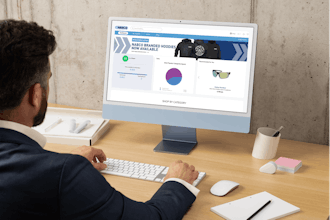Why should you know more about parcel and freight auditing and reporting? If you know more, you can not only ensure that you select the right third party parcel and freight auditing firm with which to partner, but make high-level savings decisions based on detailed reports.
Here’s how your auditing and reporting processes should work:
Carrier data that is delivered electronically directly to your third party auditing firm should be delivered on a weekly basis. Usually, all you have to do is contact your carriers and give them permission to send your shipping data to a designated third party. You should not have to house, cleanse, or manage your data yourself; in fact, you probably won’t even see your data until it comes back to you in cleansed, readable, customizable reports.
Each week, when your third party partner receives your data, the data cleansing process should begin directly after import. To scrub your data, your third party partner will most likely run it through a few or several databases which are continually updated with current carrier tariff information. Once the data is scrubbed, reports containing all of the erroneous charges on your invoice should be given to auditors who will request refunds and/or credits directly from your carriers. Depending upon the carrier, your account will either be credited immediately or applied to upcoming invoices. Your third party partner should make certain that you receive all of the credits you are due and keep you updated on the savings generated.
A reputable third party partner should not just provide you with reports that detail your savings, but other detailed reports that, based on your scrubbed carrier data, will give you an accurate picture of your actual shipping practices. Your reports should be made available to you right away so that you can not only monitor your audited savings on your end, but generate greater internal savings through greater visibility. Your better auditing and reporting firms will enable you to access all of your reports through an FTP or other Web-based platform.
I can’t stress the value of being able to view detailed, accurate reports enough. If you are provided with the right level of detail by a firm that understands not just common shipping practices, but your particular industry and your company’s unique shipping characteristics through intensive data analysis, you can do much more than simply recover lost funds. Here are just some of the things that responsible reporting can do for you:
- Allow you to gain a greater understanding of the value of your internal systems and better determine whether they need to be updated
- Avoid overspending by stopping the use of premier services
- Stop the purchase of unnecessary insurance
- Ensure better compliance with your company’s shipping policies or routing guide, not just internally, but when it comes to your vendors and partners
- Gain greater visibility and select carriers and modes more appropriately
Pinpointing invoicing errors is just a small piece of the puzzle; the big picture your reports should reveal to you can allow you to make the decisions that will help you achieve not just ongoing savings through auditing, but significant savings throughout your logistics network now and in the long term.
What you don’t know about auditing and reporting can hurt you. Not auditing your invoices because you are reasonably certain that the savings that audits will generate won’t be enough to warrant partnering with a third party or because you are tentative about developing a new third party partnership because you’ve either been burned in the past or feel that you’re doing a fine enough job managing your supply chain without one, would be a mistake. Nearly all shipping invoices, however large or small, contain errors. Your quest should not be to try and manage your invoices and invoice errors on your own, or worse, ignore them and focus on operations because out of a belief that doing so will correct or resolve the errors that are showing up which you can’t currently see, but to know enough about the auditing and reporting process to select the right third party partner that will not just help you recover funds, but provide you with the visibility you need to make smart operational decisions through purposeful reports.
Companies that rely on their own internal accounting departments to manage their supply chain expenses, including invoices, are missing out. Virtually no accounting firm for a company that is not solely dedicated to logistics is going to have an accounting department that has the ability to import detailed carrier data, house it, cleanse it, and provide your supply chain managers with detailed reports on a weekly basis. You can look into purchasing third party technology for your accounting department, but technology alone can only help you up to a certain point. Reliable and dedicated third party auditing and reporting partners can not only give you what you know you want and need in terms of savings and reporting, but can suggest that you receive certain reports that you may not have known could be made available to you, and also make valuable recommendations to you when they spot trends based on your reporting.
My advice to any supply chain manager that is looking to partner with a third party auditing and reporting firm is to partner with a firm that does more than auditing and reporting. Lots of people can put together a call center full of auditors and take a stab at getting you guaranteed service refunds, but not everyone has the expertise to run a firm that is able to provide you with more than credits and refunds by generating reports and making recommendations that will provide you with the kind of visibility that puts the power to save more directly in your hands. Don’t worry that those at the executive level will think you can’t do your job because you’ve had to partner with another third party; the savings you are able to achieve as a direct result of your partnership will quickly prove to anyone who’s paying attention to the bottom line that you are not only savvy enough to select the right third party partner for your company, but are making the most out of what your third party partner is bringing to your table.



















